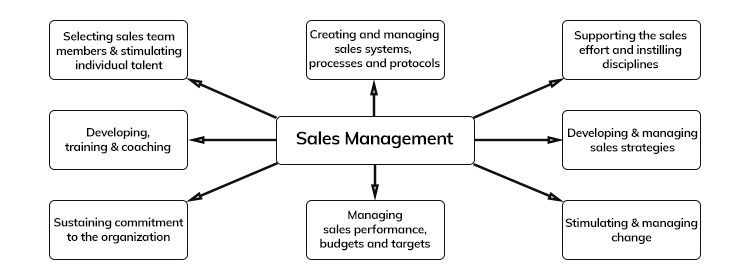
Most sales managers have sales experience. It makes sense from a career path perspective – you’re good at selling so your next logical career step is into sales management.
However, this is where the logic usually comes unstuck because selling and sales management are not the same thing.
Like a lot of salespeople learn selling by default – they fall into a sales career rather study and learn it by design – the same goes for sales management. Sales management is the least trained area of the management disciplines. Like selling, too many sales managers are left to fend for themselves, often guessing their way through what to do as a sales manager or told to focus their efforts down the narrow tunnel of sales forecasting, pipeline, results and managing CRM compliance. None of this helps create high functioning and high performing sales teams.
The brutal facts in today’s world of sales management:
- Sales leaders are given little or no support when it comes to being competent, effective sales managers.
- In most instances the majority continue to learn their craft by observing their managers and then replicating both the strengths and faults.
- Few sales leaders receive formal training in “sales management” practices – either before or during their tenure.
- Sales management training happens less than annually or not at all.
- Even where sales leadership is relatively mature, managers do not know what standards to use to coach and develop their teams.
However, when businesses do invest in training, coaching, developing sales managers to a minimum standard of sales leadership excellence, the payback for doing so can lead to around 20-40% increase in sales results.
If sales managers are more frequently and better trained and coached themselves, their sales teams achieve better results. No other type of sales training has a more positive correlation between frequency of training and sales performance.
So what are the minimum standards of sales management excellence?
The 8 Sales Management Essentials
With more than 40 years field research and experience observing and addressing sales and sales leadership challenges, Barrett has been able to identify 8 fundamental functions of sales management and leadership which provide sales managers with the knowledge, skills, confidence, and competence to:
- Define sales strategy and see to its implementation
- Develop, implement and monitor sales systems
- Inculcate sales disciplines that support a performance culture
- Stimulate innovation and change
- Select and build sales teams
- Train, teach and coach sales teams
- Facilitate territory management plans that support strategy
These 8 Sales Management Essentials are:
- Creating and managing sales systems, processes and protocols
- Supporting the sales effort and instilling disciplines
- Developing and managing sales strategies
- Stimulating and managing change
- Managing sales performance, budgets and targets
- Sustaining commitment to the organization
- Developing, training and coaching
- Selecting sales team members and stimulating individual talent
Sales management and leadership is a multifaceted role. Mastering these 8 functions is not easy; however, raising awareness and making these functions visible is the first step to sales management and sales leadership mastery. Let’s get these topics in the sales leadership agenda and stop selling and start getting sales management fit.
Remember everybody lives by selling something.
Related topics
Putting the Trainer back into Sales Management
25 Years of Sales Leadership Evolution
Without a Strategic Saleforce you are Doomed to fail
A year ago


New Article Email Notification